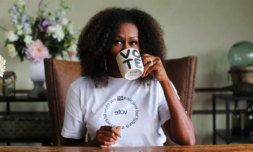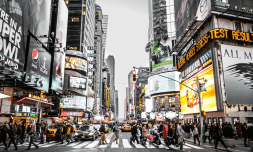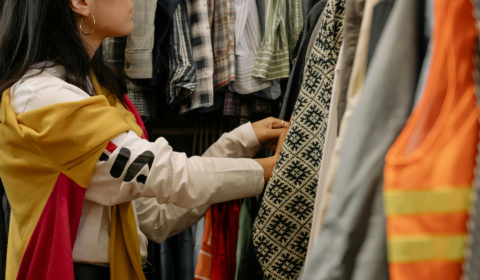We spoke with one-half of the cult-fashion brand about their work, the industry-wide push for more sustainability, and the value of using social media to start important conversations.
Headed by Marc Keiser and Andrew Clark, Keiser Clark has made quite the name for itself since officially launching three years ago. Thanks to a range of one-of-a-kind leather jackets that stirred up quite the frenzy on social media, the label blew up so fast it was able to debut an entire collection at Paris Fashion Week just months after being founded.
Powered by a ‘gritty nocturnal aesthetic’ that touches on vintage rock from a by-gone Hollywood age, it holds a unique approach to fabrication and clothing design. With a deep underlying personal sentiment beneath Keiser Clark’s visual edge, human instinct flourishes, promoting connection, creativity, and unity above all else. ‘I’m a lawyer by trade,’ starts Marc, ‘although I’ve always been interested in fashion I don’t think I ever imagined I’d be working in the industry, especially at the level I am now.’
https://www.instagram.com/p/Bz8dj2Ahqgy/
Attributing Instagram to the overwhelming popularity of Keiser Clark, Marc explains how the platform played a huge role in the brand’s growth and development. ‘Not only is it a major driving force in bringing customers to discover our brand and buy from our website, but it’s an ever-evolving lookbook that anyone can access. It really is an incredible technological resource for any fashion brand, if utilised correctly – I don’t think we’d be where we are without it.’
However, amidst the continued push for more transparency from brands (37% of Gen Z now insist upon knowing exactly what goes into products and how they’re made before they buy) Marc stresses the importance of being honest with consumers. ‘My experiences with law and knowledge of copyright and trademarking sometimes hinders my design process because I’m worried about similarities,’ he says. ‘Trust between brand and consumer is essential, there are no shortcuts, so you have to be genuinely authentic – especially on social media.’
This applies equally to a brand’s sustainability efforts, particularly for a burgeoning label striving to design and produce for today’s environmentally conscious consumer. ‘We’re very open about the fact that we don’t want to generate more waste, particularly given the current state of the world,’ says Marc. ‘We do, however, need to bear in mind that we’re a small label and sustainability expenses are therefore higher which is something we don’t shy away from.’
![]()
But Marc isn’t quite so forgiving towards the industry as a whole, expressing concerns that not nearly enough is being done to address the inherently wasteful practices that don’t appear to be going anywhere anytime soon. ‘There’s a lot of greenwashing going on and the solutions we’re seeing tend to be relatively short-term,’ he says. ‘During the pandemic we’ve made a real effort to slow down and assess how Keiser Clark can make a difference, but bigger corporations don’t really seem to have the same mindset.’
The ‘effort’ Marc mentions refers to Keiser Clark’s decision to do one big collection a year, rather than follow the industry’s traditional seasonal structure. With fashion’s trend-driven, fast-paced nature coming to a head in the wake of the ‘reset period’ brought about by Covid-19, luxury and fast fashion alike has been hard-pressed to implement significant change.
‘To navigate this we’ve ensured that all our packaging is 100% recyclable, we hang onto every single item until it sells out to avoid wasting valuable materials, and whatever ships from our website comes with a free, re-usable bag,’ he says. ‘Then there are our re-purposed vintage tees of course.’
Given the massive boom in second-hand shopping, upcycling, and trends like ‘swishing’ as of late, Keiser Clark is certainly on the right track to connecting with eco-savvy consumers. But even in light of this, Marc disagrees that there’s no place for fast fashion going forward because he believes it to be majorly beneficial in bringing fashion to the masses.

‘When you have no money and you’re on a budget it’s great because you can get stylish items for a pretty inexpensive cost,’ he explains. ‘There’s always going to be people that can’t afford a thousand dollar shirt and fashion doesn’t need to be exclusive to the wealthy so in that sense, no, I don’t think it’s seen its demise.’
He does, however, oppose the act of ‘pumping out goods for the sake of it,’ urging an increase in direct-to-consumer business which he deems the answer to cutting back on production. By showing retail partners collections in advance, designers have a better understanding of what has the potential to sell, a foresight Marc imagines leading members of the industry would do well to take on board.





















